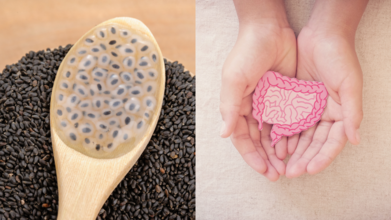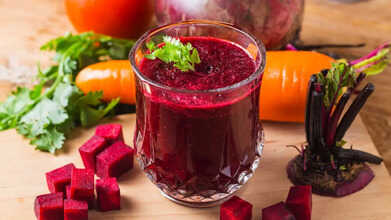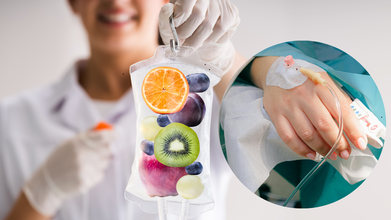- Health Conditions A-Z
- Health & Wellness
- Nutrition
- Fitness
- Health News
- Ayurveda
- Videos
- Medicine A-Z
- Parenting
- Web Stories
Harvard Gut Doctor Dispels Basil Seeds Myths You Probably Believed

Credits: Canva
If you have been following trends on social media, you know how much attention basil seeds get, besides, of course, the evergreen chia seeds. Also known as sabja or tukmaria, basil seeds are often mistaken for chia seeds. But do they really live up to the internet hype? A Harvard gut health expert, Dr Saurabh Sethi, has been setting the record straight and some of these myth-busting facts may surprise you.
Are Basil Seeds Gut Friendly?
Basil seeds are absolutely the best when it comes to supporting your gut microbiome. Their high fibre content helps feed the good bacteria in your intestines, which in turn keeps digestion smooth and balanced. If constipation has been your unwanted house guest, soaking a spoonful of these seeds in water and sipping them down could push things back into rhythm.
What About the Weight Loss Hype?
Unlike flashy diet supplements, basil seeds take a more old-fashioned approach: they simply swell up in your stomach after soaking. This expansion creates a natural feeling of fullness, which can help curb those unnecessary snack attacks. Pair them with a balanced diet and you have got yourself a sustainable weight-management tool.
Beware the Bloat
Before you go overboard, there is something you must know. Eating basil seeds dry or in excess can cause bloating and discomfort. They are water-hungry seeds, designed to absorb several times their weight in liquid. So if you skip the soaking step, they might pull water from your gut instead, leaving you puffed up and regretting your health experiment.
Built-In Hydration
Speaking of water, basil seeds act like tiny sponges. Once soaked, they hold on to significant amounts of liquid, which can help your body stay hydrated, especially during hot weather. They are like edible water, refreshing and surprisingly functional.
They Boost Fertility?
Despite what you may have heard in wellness WhatsApp groups, there is no scientific evidence linking basil seeds to improved fertility. The internet loves a miracle cure, but sadly, this is not one of them.
Blood Sugar and Cholesterol Control
If you are keeping an eye on blood sugar, basil seeds might be your quiet ally. Studies suggest that they slow down the absorption of carbohydrates, helping prevent sudden glucose spikes after meals. They may also contribute to lowering cholesterol, making them a handy add-on to heart-friendly diets.
Does it Boost Your Mood?
Wish they worked as antidepressants? Same here. While they are certainly nutritious, current evidence does not support the idea that basil seeds can directly lift depression. Instead, they support your wellness routine rather than taking care of your mental health.
Packed with Nutrients, Not Calories
A tablespoon of basil seeds gives you only about 40–50 calories, making them light on energy but rich in minerals. They are naturally gluten-free and loaded with calcium, magnesium, and iron—all essentials for strong bones and overall vitality. If dairy does not suit you, basil seeds can step in as a small but mighty calcium source.
How Much Should You Actually Eat?
The sweet spot is just 1–2 teaspoons of soaked basil seeds daily. That is enough to reap their benefits without overdoing it. Toss them into lemon water, stir them into smoothies, or sneak them into desserts for a fun texture.
Basil seeds are not a cure-all, but they are far from overrated. They hydrate, support digestion, aid in weight control, and deliver essential minerals. All while being light on calories. Just remember: soak before eating, keep the portions modest, and ignore the wild claims about fertility or instant happiness.
ABC Juice: This Everyday Drink Could Be Your Secret Health Weapon, Nutritionist Explains How

Credits: Canva
Drinking juice is a simple and enjoyable way to add vital nutrients to your daily diet. Many people like to kickstart their mornings with a glass of fresh juice, whether it’s the popular green juice or the classic orange juice. Among the wide variety of wellness drinks, ABC juice has carved a niche for itself, offering health benefits that many other beverages can’t match. We spoke with Lena Bakovic, an experienced Registered Dietitian Nutritionist with over eight years in the field at Top Nutrition Coaching, who shared the many advantages of including ABC juice in your routine.
What Is ABC Juice?
According to Lena, ABC juice combines raw apples, beetroots, and carrots, creating a drink packed with essential nutrients. It offers fibre, antioxidants, and several micronutrients, including potassium, zinc, and iron. Here’s a closer look at each ingredient:
- Apple: Apples are loaded with fibre, vitamin C, potassium, and vitamin E. They support digestive health, promote heart health, and can help with weight management.
- Beetroot: Beetroots are nutrient-rich while being low in calories. They provide folate, fibre, vitamin C, potassium, iron, and even a small amount of protein.
- Carrot: Carrots are a great source of vitamin A, essential for healthy eyesight. They also contain potassium, vitamin B6, biotin, fibre, and vitamin K.
Benefits Of ABC Juice
Lena told us that ABC juice is generally low in calories, making it ideal for those keeping an eye on their weight. Its fibre content supports gut health, aiding digestion and overall intestinal function. The iron in the juice can also be helpful for those with iron deficiency anemia, potentially helping to replenish iron stores.
Additionally, the antioxidants in ABC juice may help fight free radicals, which in excess can contribute to chronic conditions like cardiovascular disease and certain cancers. While the juice’s nutrient richness may support immune health, strong scientific evidence is lacking. Similarly, claims that ABC juice boosts metabolism are not yet backed by robust clinical trials.
How To Make ABC Juice
Making ABC juice at home is easy and requires just a few simple steps. Here’s the method:
Ingredients:
- 2 apples
- 1 medium beetroot
- 2 carrots
- Optional: a splash of lemon juice or a small piece of ginger for extra flavour
Instructions:
- Rinse the apples, beetroot, and carrots thoroughly.
- Peel the beetroot and carrots.
- Remove the cores from the apples and chop them into smaller pieces.
- Cut the beetroot and carrots into chunks.
Juicing:
- Using a juicer: Feed the apple pieces, beetroot chunks, and carrot pieces into the juicer, collecting the juice in a container.
- Using a blender: Add the chopped apples, beetroot, and carrots to the blender. Blend until smooth, adding a little water if needed. Then strain the mixture through a fine mesh sieve or cheesecloth to separate the juice from the pulp.
- Add Optional Ingredients: Mix in a bit of lemon juice or a small piece of ginger for extra flavour if desired.
Serve:
Pour the juice into a glass and enjoy immediately to get the best taste and nutritional benefits.
Storage:
Any leftover juice can be kept in an airtight container in the fridge for up to 24 hours.
Enjoy your refreshing, nutrient-packed ABC juice!
Pink Salt, Sea Salt, Celtic Salt: Are They Really Beneficial Or Just Some Fancy Names

Credits: Canva
Social media platforms have taught us a lot about health, but sometimes, it has also tricked us into believing things which may not be in the best interest of us. Now, we are hearing more and more about the trend of using Himalayan salt and replacing the table salt, which we would commonly use. For some, using this salt in beverage helps them lose weight. While for others, the variants like Celtic salts and seat salts are mineral-rich alternatives. However, doctors say otherwise.
What Is The Reality of Pink Salt, Sea Salt And Celtic Salt?
Celtic Salt is unrefined and non-processed salt without harsh chemicals or anti-caking agents. It naturally contains a wide array of minerals, including magnesium, calcium, potassium, zinc, and iron, in addition to sodium chloride.
While sea salt has the same mineral compounds, it is more dry in nature and has more variation in texture, from ultra-fine grains to large, and even flaky crystals.
Pink salt or Himalayan salt is a type of rock salt, which is mined from Khewra Salt Mine in Pakistan, and is known for its distinctive pink hue from trace minerals like iron and potassium. It is natural, unrefined, and is known for the mineral-rich component that it is.
However when doctors are asked whether such unrefined, raw, and mineral-rich salt should be substituted for the regular table salt, their answer is "No".
Dr Shipra Gulati, consultant physician at Sir Ganga Ram Hospital said that any form of rock salt, while rich in mineral, is associated with thyroid problems. Why? Because these salts lack iodine, which is present in common salt. Absence of iodine leads to thyroid problems, notes the World Health Organization (WHO). This is why the government of many countries have iodised the salt so thyroid issues could be prevented. When one substitutes any other salt with regular iodised salt, then the risk to thyroid, brain damage and mental retardation increases.
What About Blood Pressure?
Dr Gulati also cites examples of where people replace rock salt with regular table salt stating hypertension reasons. However, she says, "the component of sodium chloride is same in both the salts". Thus, replacing the salt will not be fruitful.
What About The Minerals?
Health guidelines by American Heart Association suggests the upper limit is 2,300 mg, which is roughly 1 teaspoon a day. Experts point out that in order to actually utilise the minerals present in other salts, one must consume more than the recommended levels of salt, as consuming just 1 teaspoon a day will not make any difference in terms of the minerals. However, if more than this amount is consumed, it could trigger high blood pressure, as sodium chloride are almost same for all the salts.
Dr Susan Cheng and Dr Evan Levine, two cardiologists, reported by Today.com noted that using too much "fancy" salts could be more detrimental to your health.
Dr Cheng says that coarser texture from rock salt, Celtic salt or sea salt and their larger crystal could make it simple to unknowingly overuse them. "The satisfying crunch makes you feel like you're using a little bit, but really you're adding a lot of extra sodium."
Dr Levine suggests: "Don't fall for the salt hype". Dr Levine also bursts health myths on TikTok and says that many people consume the alternatives for being "less processes". However, "it is sodium chloride, just like your regular salt. The so-called benefits are negligible. You are still eating salt."
IV Hydration For Vitamins Could Be Putting Your Life At Risk, According To Doctors

Credits: Canva
While more and more IV hydration spas are coming up in the US, a new study published on October 6 in JAMA Internal Medicine found that IV hydration industry operates with almost no regulation and little medical evidence to support its supposed health benefits.
The co-author of the study Dr Peter Lurie, who is the president of the Center for Science in the Public Interest told the NBC News that these businesses are operating "almost completely without evidence. As a result there is a real danger to consumers".
In the US, out of the 50 states, or 32 have some kind of rule or policy related to IV hydration services, however, only four states: Alabama, North Carolina, South Caroline and Vermont have a comprehensive oversight. These hydration spas offer pricey vitamin infusions that promise energy, detox or immune support. Apart from the lack of evidence to sustain its claim on the benefits IV hydration supposedly offers, it is also an expensive process. According to the American Med Spa Association, this industry has exploded into a $15 billion wellness industry.
Is it really worth it?
Here is what the doctors say about IV hydration:
Dr Shrey Kumar Srivastav, Senior Consultant, Internal Medicine at Sharda Hospital told Health and Me that while there is no standard frequency for IV therapy in healthy individuals, "frequent or routine use can cause vitamin toxicity or electrolyte imbalances."
Dr Prashant Sinha, Head of Emergency and Internal Medicine at PSRI Hospital, Delhi, said that for a healthy person with no diagnosed deficiency, there is generally no medical reason to receive IV supplements regularly. "Getting them too frequently can lead to nutrient overload or dependency, where the body becomes less efficient at natural nutrient absorption," he pointed out.
Both the doctors also debunk the claim that IV supplements are better than the vitamins one consumes through food. "Supplements taken orally or through food are typically safer, more sustainable, and sufficient for most people," explained Dr Srivastava.
Also Read: If You're Alone At Home And Experience A Heart Attack, Here's How You Survive: According To Doctor
Dr Sinha also clarified that IV supplements are in most cases not better than supplements consumed through food or medicines. "Whole foods provide not only individual nutrients but also fiber, antioxidants, and enzymes that support overall health. Oral supplements, when taken as prescribed and for medically confirmed deficiencies, are also effective for most people and pose far fewer risks than IV therapy," he points out.
Dr Srivastava further added that IV supplements are not superior to food or oral supplements for general wellness or weight loss. "The growing trend of using IV injections for cosmetic or slimming purposes is risky, unregulated, and can be fatal."
Lurie also said, "This is a medical system that exists largely outside of conventional medicine. We are also worried that there will be adverse effects related to this."
Alex Thiersch, the CEO of the American Med Spa Association said that many of the owners of these businesses do not realize that they are practicing medicine, however he notes, "If you are putting a needle in someone's vein, that's 100% medical practice."
© 2024 Bennett, Coleman & Company Limited

